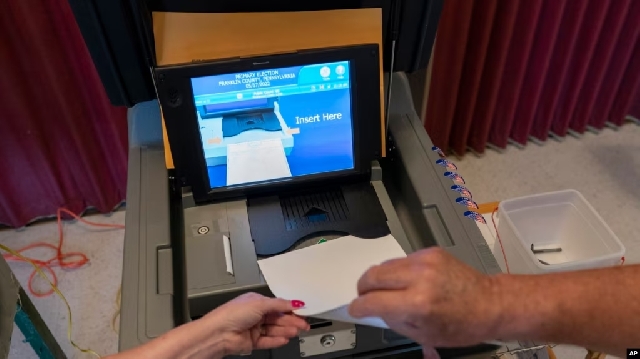US voting systems, targets of conspiracy theories, get tested for accuracy, security
 A polling judge, right, helps guide a voter's ballot into a voting machine during the Pennsylvania primary election at Mont Alto United Methodist Church in Alto, Pennsylvania, on May 17, 2022
A polling judge, right, helps guide a voter's ballot into a voting machine during the Pennsylvania primary election at Mont Alto United Methodist Church in Alto, Pennsylvania, on May 17, 2022
Voting machines have been at the center of a web of conspiracy theories after the 2020 U.S. election, with false claims that they were manipulated to steal the presidency from Donald Trump.
There was no evidence of widespread fraud or rigged voting machines in the election, and multiple reviews in the battleground states where the Republican president disputed his loss to Democrat Joe Biden confirmed the results as accurate. In 2023, Fox News agreed to pay Dominion Voting Systems, one of the largest voting machine companies, $787 million to avoid a trial in a defamation lawsuit.
In the years since his loss, Trump and his allies have continued to sow doubts about voting equipment. State and local election officials have tried to push back by explaining the layers of protection that surround voting systems and the measures they have in place to conduct fair and accurate elections.
In November's presidential election, nearly every ballot cast will have a paper record that can be used to obtain an accurate count even if there are errors or cyberattacks.
What is a voting machine?
Election officials rely on various pieces of technology. Every office does things a little bit differently.
Officials rely on a voter registration system that is a database of registered voters and have an election management system that workers use to create, issue and track ballots. They also use an election-night reporting system that reports unofficial results. Many jurisdictions use electronic pollbooks to check in voters at polling locations.
All this depends on software and computers, a reliance that carries risks that officials work to identify and address. For example, election officials often will isolate critical systems from the internet and use storage devices, such as secured USB sticks, to transfer data. They limit access to sensitive equipment to only those who need it and have logs that track and monitor the devices.
When an internet connection is needed, election officials will often use private networks to limit the risk of malicious activity and take other steps to scan their systems for potential vulnerabilities and threats.
Voters in much of the country fill out ballots by hand, and then that ballot will be scanned and counted electronically. A few places, mostly small towns in the Northeast, will count their ballots by hand.
In some areas, voters use a computer to mark their ballots electronically and then get a printout of their choices that they insert into a scanner for counting. In other cases, the ballot is cast electronically, and a paper record is printed that summarizes the votes cast. That record is then available if a hand count is needed.
Are voting machines connected to the internet?
With a few exceptions, no. There are some jurisdictions in a few states that allow for ballot scanners in polling locations to transmit unofficial results, using a mobile private network, after voting has ended on Election Day and the memory cards containing the vote tallies have been removed.
Election officials who allow this say it provides for faster reporting of unofficial election results on election night. They say the paper records of the ballots cast are used to authenticate the results during postelection reviews, and that those records would be crucial to a recount if one was needed.
Computer security experts have said this is an unnecessary risk and should be prohibited.
Are voting machines secure?
Election officials say they have worked extensively to shore up security around their voting equipment after an effort by Russia to scan state voter registration systems for vulnerabilities in 2016.
There was no evidence then that any data was changed or deleted, but it led the federal government to declare the nation's election systems as critical infrastructure. That allows the U.S. Cybersecurity and Infrastructure Security Agency to provide free cybersecurity reviews and vulnerability testing to election offices nationwide.
"Today, eight years later, because of all the incredible work by election officials to strengthen the security and resiliency of our election process, election infrastructure has never been more secure, and the election stakeholder community has never been stronger," the agency's director, Jen Easterly, told reporters in September.
Computer security experts have called for more to be done and for election officials to limit the use of certain technology, specifically machines that mark ballots for voters. A long-running court battle in Georgia has sought to compel the state to get rid of these machines in favor of hand-marked paper ballots.
Experts have also raised particular concern about a series of security breaches that occurred after the 2020 election as Trump allies sought access to voting systems in Georgia and elsewhere as they tried to prove their unsubstantiated claims. The experts have warned that the public release of critical election software because of the breaches has raised "serious threats" and have called for a federal investigation.
How do election officials ensure accuracy?
Election officials say there are safeguards in place to ensure that voting systems are not manipulated. That begins with physical security, such as locked rooms with limited access and the use of tamper-evident seals. In addition, voting equipment is tested before the election, a process that includes running test ballots through the equipment to ensure votes are being counted correctly.
Postelection reviews are conducted to identify any mistakes or errors that may have occurred.
Around 98% of all ballots cast in this year's election will include a paper record, according to a report by the Brennan Center for Justice based on data collected by Verified Voting, a nonpartisan group that tracks voting equipment in the U.S. Officials say that's important for ensuring that any error or cyberattack will not prevent officials from producing an accurate record of the vote.
Source: apnews.com
Trending World

BBC complains to Apple over misleading shooting headline
04:58
West Africa bloc meets as military rulers vow to quit
16:09
2024 African elections: Some ruling parties retain power, some suffer defeats
14:54
Human Rights Watch accuses Sudan’s RSF of rape, sexual slavery
04:06
Nigeria investigates nearly 800 suspects arrested in massive cybercrime raid
03:08
Storm Chido kills at least 7, leaves trail of damage in Malawi
03:05
More than 2 million Nigerians kidnapped in one year, survey finds
05:32
China counting on cyber-psychological cocktail to expand dominance
11:33
Mogadishu development project brings hope to Somalia
11:41
Myanmar ethnic rebels say they’ve captured junta western command
11:37



